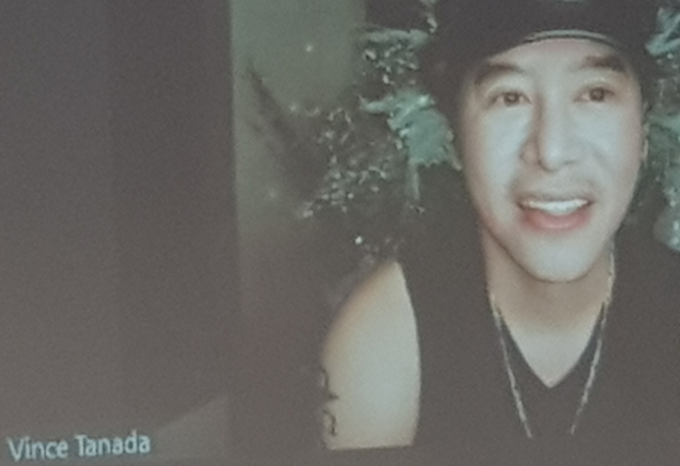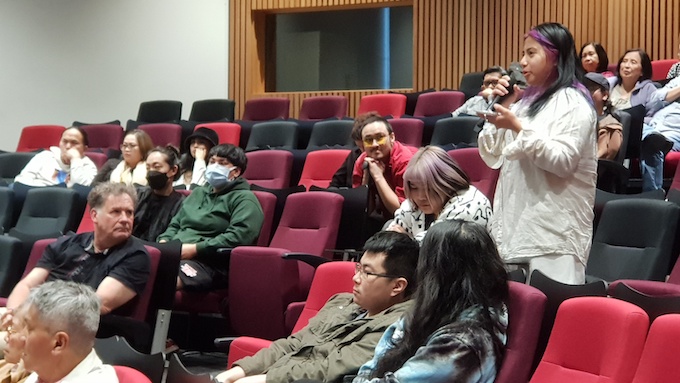REVIEW: By David Robie
Seven weeks ago the Philippines truth-telling martial law film Katips was basking in the limelight in the country’s national FAMAS academy movie awards, winning best picture and a total of six other awards.
Last week it began a four month “world tour” of 10 countries starting in the Middle East followed by Aotearoa New Zealand today – hosted simultaneously at AUT South campus and in Wellington and Christchurch.
The screening of Vincent Tañada’s harrowing – especially the graphic torture scenes – yet also joyful and poignant musical drama touched a raw nerve among many in the audience who shared tears and their experiences of living in fear, or in hiding, during the hate-filled Marcos dictatorship.
The martial law denunciations, arbitrary arrests, desaparecidos (“disappeared”), brutal tortures and murders by state assassins in the 1970s made the McCarthy era red-baiting witchhunts in the US seem like Sunday School picnics.
Amnesty International says more than 3200 people were killed, 35,000 tortured and 70,000 detained during the martial law period.
Tañada has brushed off claims that the film has a political objective in an attempt to sabotage the leadership of the dictator’s son, Ferdinand Bongbong Marcos Jr, who won the presidency in a landslide victory in the May elections to return the Marcos family to the Malacañang.
He has insisted in many interviews — and he repeated this in a live exchange with the audiences in Auckland, Wellington and Christchurch — that the film is educational and his intention is to counter disinformation and to ensure history is remembered.
Telling youth about atrocities
Tañada, from one of the Philippines’ great political and legal families and grandson of former Senator Lorenzo Tañada, a celebrated human rights lawyer, says he wanted to tell the youth about the atrocities that happened during the imposition of martial law under Marcos.
He wanted to tell history to those who had forgotten and those who aren’t yet aware.
The Katips movie trailer.
“You know, as an artist it is also our objective not just to entertain people but more important than that, we are here to educate,” he says.
“We also want to educate the young people about the atrocities – the reality of martial law.
“History is slowly being forgotten. We have forgotten it during the last elections and I guess we also have the responsibility to educate and let the youth know what happened during those times.”

It is rare that such brutal torture scenes are seen on the big screen, and before the main screening at AUT the organisers — Banyuhay Aotearoa, Migrante Aotearoa and Auckland Philippine Solidarity — showed two shorts made by the University of the Philippines and Santo Tomas University of Manila featuring martial law survivors describing their horrifying treatment during the Marcos years to contemporary students.
Some of the students broke down in tears while others, surprisingly, remained impassive, sometimes with an air of disbelief.
The film evolved from the 2016 stage musical Katips: Mga Bagong Katipunero – Katips: The New Freedom Fighters, which won Aliw Awards for best musical performance that year.
Freedom fighter love story
In a nutshell, Katips tells the love story of Greg, a medical student and leader of the National Unions of Students in the Philippines (NUSP), who with other freedom fighting protesters stage a demonstration against martial law on a mountainside called Mendiola.
His professor is abducted by the state Metropol police, murdered and his body dumped in a remote location.
The protesters begin a vigil and the police brutally suppress the protest and arrest and kidnap other freedom fighters. They are subjected to atrocious torture and their bodies dumped.
A safehouse branded “Katips House” takes in Lara, a New York actress and the daughter of the murdered professor who is visiting Manila but doesn’t yet know about the fate of her father. Lara and Greg form an unlikely relationship and their lives are thrown into upheaval when the safehouse “mother” Alet is abducted and tortured to death.
Greg and another protester, Ka Panyong, a writer for the underground newspaper Ang Bayan, are forced to flee into the jungle for the safety and become rebels. Both get shot while on the run, but manage to survive.
When Greg returns to Lara at the “Katips House” during the Edsa Revolution in 1986, he finds he has a son.
The film has a stirring end featuring the Bantayog ng mga Bayani, a memorial wall to the fallen heroes struggling against martial law– a fitting antidote to the Marcoses and their crass attempts to rewrite Philippine history.
Ironically, the same month that Katips was released in public cinemas, another film, the self-serving Maid of Malaçanang, was launched in a bid to perpetuate the Marcos myths.
- Katips – The Movie, director Vincent Tañada (2022)

This post was originally published on Asia Pacific Report.
